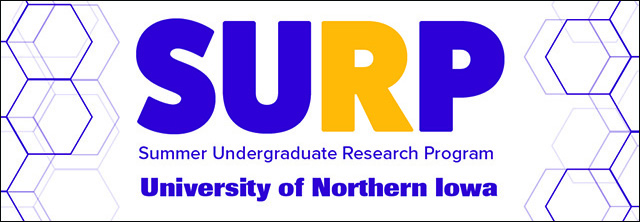
2023 Summer Undergraduate Research Program (SURP) Symposium
Location
ScholarSpace, Rod Library, University of Northern Iowa
Presentation Type
Open Access Poster Presentation
Document Type
poster
Keywords
Metabolites; Anti-infective agents;
Abstract
Fungi produce secondary metabolites, which are organic compounds that allow the organism to be competitive in their environment. Secondary metabolites are not involved in growth and development, instead they affect ecological interactions to increase survivability. These compounds will often have antimicrobial properties, leading to their use in antibiotics. Isolating a compound with significant antimicrobial activity could lead to its use in therapeutic antibiotics. New antibiotics are needed to address the growing issue of antimicrobial resistant bacteria. This project explores the antimicrobial compounds produced by fungi collected Wind Cave National Park or carried by local insects. Accurate taxonomic identification of the fungal samples is essential to gain a full understanding of the fungus and its potential biochemical properties. Results to date are presented.
Start Date
28-7-2023 11:00 AM
End Date
28-7-2023 1:30 PM
Event Host
Summer Undergraduate Research Program, University of Northern Iowa
Faculty Advisor
Kirk Manfredi
Department
Department of Chemistry and Biochemistry
Copyright
©2023 Elizabeth E. Guevara, Kirk P. Manfredi
Creative Commons License

This work is licensed under a Creative Commons Attribution 4.0 International License.
File Format
application/pdf
Recommended Citation
Guevara, Elizabeth E. and Manfredi, Kirk, "Analysis of Biologically Active Secondary Metabolites from Fungi" (2023). Summer Undergraduate Research Program (SURP) Symposium. 6.
https://scholarworks.uni.edu/surp/2023/all/6
Analysis of Biologically Active Secondary Metabolites from Fungi
ScholarSpace, Rod Library, University of Northern Iowa
Fungi produce secondary metabolites, which are organic compounds that allow the organism to be competitive in their environment. Secondary metabolites are not involved in growth and development, instead they affect ecological interactions to increase survivability. These compounds will often have antimicrobial properties, leading to their use in antibiotics. Isolating a compound with significant antimicrobial activity could lead to its use in therapeutic antibiotics. New antibiotics are needed to address the growing issue of antimicrobial resistant bacteria. This project explores the antimicrobial compounds produced by fungi collected Wind Cave National Park or carried by local insects. Accurate taxonomic identification of the fungal samples is essential to gain a full understanding of the fungus and its potential biochemical properties. Results to date are presented.


